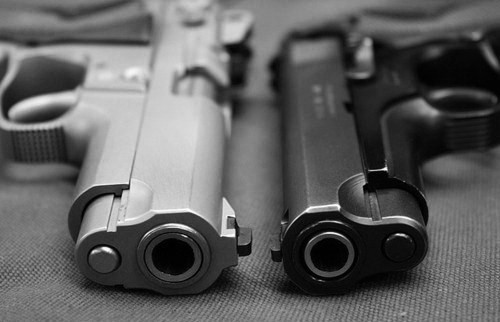What type of weapons are guns?
The barrel of the revolver includes rifling—a sequence of grooves with a particular twist that reason the bullet to spin because it exits the gun. To produce the rifling, a employee draws a broach-like reducing device through the barrel clean repeatedly, eliminating metallic to approximately .01 inch deep. In an opportunity technique called 'button rifling,' a hardened shape tool is drawn via the barrel blank below excessive force, displacing the metallic within the grooves without slicing. CCI small pistol primers in stock This is comparable in some respects to the forging operation, handiest it's far finished without heating the barrel.

The cylinder for firing. At the give up of the travel, the hammer is latched by means of the trigger sear and held prepared for firing. When the cause is fully depressed, the hammer unlatches from the cause sear and is propelled forward by way of the hammer spring. This electricity is transmitted to the firing pin, which strikes the primer of the cartridge, firing the weapon. This sequence of firing is known as unmarried movement.
With the advent of the double movement design, a connection bar turned into used to permit the trigger to rotate the cylinder, cock the hammer, and entire the firing in a single movement. This design promoted an increase in rate of firepower and simplified the draw and fire state of affairs. Most cutting-edge revolvers are of the double motion design. After firing, the shooter releases the cause. The cause spring then returns the trigger to the ahead role and forces the hand and latch to retract inside the body in education for the subsequent shot. Once the cartridges were fired, the cylinder latch on the facet of the body is pressed, disengaging the cylinder pin from the body. This permits the whole assembly to swing out of the body on the crane for reloading. The extractor shaft is pressed, lifting the cartridge instances out in their chambers, after which the cylinder spring returns the extractor to the cylinder. Live cartridges are once more loaded and the cylinder is then simply driven returned into the frame, in which the cylinder pin spring latches it back into region.
Raw Materials
With the exception of the grips, which may be timber or plastic, nearly all additives of the revolver are metal. Steel became the primary metal until adjustments in its availability and advances in other metals rendered them extra proper. For instance, at some point of the 1860s, the disruption within the metallic supply caused by the Civil War caused the use of brass for revolver frames. During World War II, the want for a lightweight weapon to be used through aircraft crews delivered approximately the use of a aluminum alloy frame. The stainless-steel frame and barrel quickly observed, enhancing corrosion resistance and lowering renovation.
The Manufacturing
Process
Forging the components
1 The most important components of maximum revolvers begin as a group of steel or stainless steel blanks which are solid into near approximations of the favored elements. The basic form of each element is formed by way of placing a heated blank of material right into a forging press and impacting it with numerous hundred tons of force. This impact forces the steel into the forging die, a metal block with a cavity shaped just like the part being produced. Sometimes, a couple of strikes by way of the click are required, each with a greater unique die than the previous step. The resulting component is each extraordinarily sturdy and very much like final shape.
By using this site you agree to this Privacy Policy. Learn how to clear cookies here
Päivittäinen posti tuo sinulle parhaat tarinat ja kuumimmat uutiset क्या आप अपने घर से बाहर बंद हो गए हैं? क्या आपने अपनी कार की चाबियां अंदर ही छोड़ दी हैं? घबराएं नहीं, हम आपकी मदद करेंगे! Show Jana Krause Adriano De Pierro: un talentueux footballeur suisse au parcours hors du commun Adriano De Pierro: Fußball ist mein Leben Adriano De Pierro: Ein Fußballdiamant aus der Schweiz What type of weapons are guns? What's a Weed Stash Box? OST file